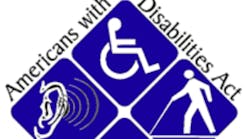Texas dentist threatened with lawsuit for website being non-compliant with Americans with Disabilities Act
Dental practices are taken by surprise when they find out they can be sued if their websites do not comply with the American with Disabilities Act. This is not a scam! What can your dental practice do to avoid this problem?
I recently received a frantic note from a very worried Dallas-area dentist. He asked, “Do you know if you or someone you know can fix my website so that it is compliant with the Americans with Disabilities Act (ADA) criteria? Please let me know as soon as you can because there is some litigation going on. Thank you.”
“Some litigation” is putting it mildly. This dentist was threatened to be sued in federal court because his website was not compliant with the ADA. It’s costing him thousands to fight this. Also, what if the state dental board gets wind of this pending lawsuit?
This is not a scam
Here’s a little background. Title III of the Americans with Disabilities Act provides people with disabilities with equal access to buildings, public restrooms, restaurants, and more. The Department of Justice has suggested and a federal court has case ruled that the law applies directly to websites. For example, those who are visually impaired can’t see images, so a website should include appropriate tags and data to “speak” what those images look like.
According to the Centers for Disease Control and Prevention (CDC), one in five American adults live with a disability, which means most dentists have patients right now who are disabled and trying to access their non-compliant websites. Although the ADA does not award monetary damages to private parties bringing ADA lawsuits, it does allow for “reasonable” attorney fees, which means big money is on the line, and which can end up being an astronomical cost in the eyes of many small and medium sized businesses.
3 things you need to know
1. Regardless of what state you’re in or what type or size of practice you have, right now chances are very good your website is not ADA compliant and it needs to be, even if you hired a website company to design it. There are a lot of website companies telling customers they’re compliant when they’re not, just to save business. Not to mention, it’s the right thing to do. You have patients who are disabled in your community seeking dental care (some of them veterans) who need and want to be taken care of. Trust me, they’ll be the most loyal patients who pay, stay, and refer for the rest of your career.
2. This is a very real threat and dental practice owners need to take it seriously; the law is not going away. If you don’t have a website that is 100% compliant with the American with Disabilities Act, you are 100% at risk. Some unscrupulous attorneys out there have started shaking down dentists who are non-compliant with “demand letters,” threatening (and in some cases filing) federal lawsuits. This is not because they care about providing accessible web browsing conditions for all, but because they see dollar signs.
3. My team and I have been tracking the efforts of these attorneys, and we’ve found a pattern. They target dentists because they know they’re not compliant with the ADA standards on their websites and they don’t have deep corporate pockets to fight back, so they often just cave in and settle. Dental practices are easy pickings for these law firms. That means that if your practice website is not 100% compliant with the ADA regulations (which read like a Harvard law textbook), your practice is vulnerable to these extortionists’ expensive shakedowns.
With that said, don’t panic. If you’d like to check if your website is ADA compliant, you can start by checking with us or a trusted source. The bottom line is you shouldn't delay: take the necessary steps to avoid this potentially dangerous situation.
Graig Presti is founder and CEO of three-time Inc. 500/5000-recognized company Local Search for Dentists (LSFD), located in the heart of the tech mecca in Austin Texas. LSFD has officially launched the first American with Disabilities Act (ADA) compliant website program in dentistry. LSFD helps thousands of dentists gain dominance in their local markets. LSFD’s proprietary marketing systems have helped thousands of dentists achieve more freedom, greater new patient numbers, and the ability to reach their income goals.
For the most current dental headlines, click here.
About the Author

Graig Presti
Graig Presti is an award-winning marketing expert, founder, and CEO of Local Search For Dentists® (LSFD). LSFD has ranked on the national Inc. Magazine Top 500/5000 Fastest Growing Companies list for the fourth year in a row, and only 10% of businesses have achieved this. This means LSFD has been recognized four times as one of the most reputable, fastest growing, and most successful companies in the country. The main reason for their success is the direct success of their clients.
LSFD’s proprietary dental marketing systems have helped thousands of dentists achieve more freedom, greater new patient numbers, and the ability to reach their income goals. Visit localsearchfordentists.com/de12 for a free copy of LSFD’s Google reviews cheat sheet.
Bio updated September 7, 2017

